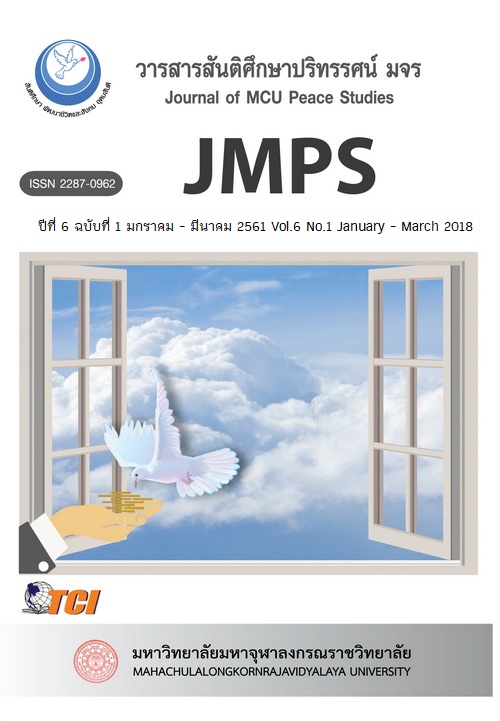The Relationship between Monks and Laities in Buddhism
Main Article Content
บทคัดย่อ
This dissertation entitled ‘The Relationship between Monks and Laities in Buddhism’ has three objectives: 1) to study the status of Buddhism monks and laity in Buddhism, 2) to study the relationship between Buddhist monks and laity in Buddhism, and 3) to analyze the relationship between Buddhist monks and laity in Buddhism. This is a qualitative research.
In the study, it was found that:-
1. Buddhist monks in Buddhism basically mean people who renounce their household life and become ordained so that they can have time to study Dhamma and follow the Buddha’ way of life. Once ordained, the special status can be expected: 1) they follow certain kind of practice to gain renunciation, 2) they become ascetic living without house, and 3) they refrain from sexual intercourse. In living life as monks, some rules about their connection with societies, both Buddhist monks and lay people, had been given by the Buddha; Buddhist monks’ running away from society and then living in the forest, mountain or even remote areas without any association with society was not allowed.
2. In this research, four kinds of relationship were found as follows: 1) general lay people are associated with Buddhist monks as Veyyăvaccakara or Kappiyakăraka, 2) lay people are relative, 3) lay people are women, and 4) lay people who are king or king’s relatives. In these matters, disciplinary rules are laid down by the Buddha so that there can be ways in dealing with laity by means of loving kindness; Buddhist monks should associate with and support lay people without violation of Dhamma and Vinaya with a view to certainly benefit them not aiming at materiality or mingling with them. As regards this case, examples were found that: 1) Buddhist monks should not act as servicers to lay people in various activities, 2) Buddhist monks should not always ask for something where one’s faith is decreased, 3) if there is, punishment should be imposed on Buddhist monks who harm the good relationship between Buddhist monks and lay people so that mindfulness giving rise to perfect realization of wrong action can be regained in order to do good action.
3. The relationship between Buddhist monks and laity is concerned, it showed that the principles depending upon each other are given as follows: 1) four requisites are offered by lay people to Buddhist monks so that they can live their life without any obstacles in searching for those requisites, under these circumstances, they can have time to study and practice Dhamma properly, 2) once supported by lay people, they should repay laity through preaching Dhamma to them in order to be morally good members of society; lay people should be given certain benefit from following Buddhism, they should observe at least five kinds of Dhamma, namely, faith, precepts, learning, generosity and wisdom. Buddhist monks should associate with lay people who give invitation to them, they should not ask for four requisites or support in extravagant manners, and they should behave easily to be supported. In this way, Buddhist monks may offer more support to laities who are their relatives especially parents than other. Giving four requisites to their parents is also allowed, while dealing women, Buddhist monks should behave carefully, not stay too close or being familiarized by improper manners.
Article Details
ทัศนะและความคิดเห็นที่ปรากฏในบทความในวารสาร ถือเป็นความรับผิดชอบของผู้เขียนบทความนั้น และไม่ถือเป็นทัศนะและความรับผิดชอบของกองบรรณาธิการ ยินยอมว่าบทความเป็นลิขสิทธิ์ของวารสาร


